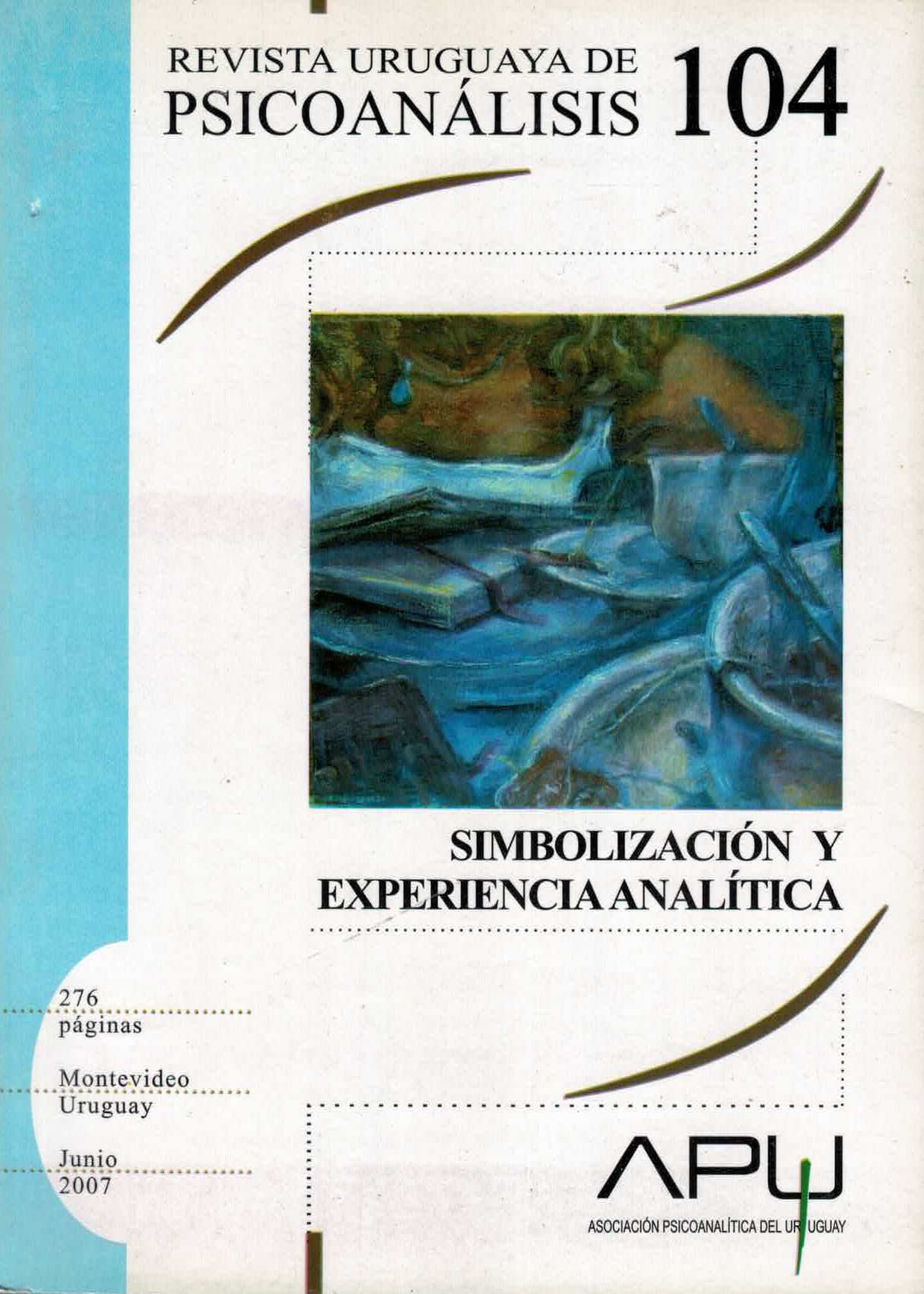A «now moment» in a psichotherapeutic process: «The game of the hands». Contributions from the microanalytic research in infants to the theories of intersubjectivity.
Keywords:
relación madre-bebé, intersubjetividad, investigación científica, material clínicoAbstract
In a psychotherapeutic framework of a session we privilege a “present moment” of 54 seconds. The aim is to deep into the mental
states of the patient (a 13 months old girl) her mother and the analyst through a short “hands play” in between the analyst and
the girl. We get in contact with the forces that are moving their psychisms. We wonder which of these forces are being activated
and moved in the psychotherapeutic relationship and the resistances with which they come across.
Different intersubjectivity theories (Meltzoff, Trevarthen, Stern, Gergely) based on infant research are considered in their
entailment with this clinical moment. It is in this implicit procedimental level that strong emotional
patterns of gazing, vocalizations, corporal posture are held. These patterns of interactions let us see how each one is influenced by
the other.
Downloads
References
ALTMANN DE LITVAN, M. (1997) “Correlato entre el bebé observado inferido”. Revista Uruguaya de Psicoanálisis. Montevideo, Uruguay.
_______ (2002) “Jeu et regulation affective”. En Revue Spirale 24. Jue bebé jue. Decembre, pp.138-149.
_______ (2005) La observación de bebés: un campo de preguntas y desafíos para el psicoanálisis contemporáneo. Revista Uruguaya de Psicoanálisis Nº100, 412-443.
ALTMANN DE LITVAN, M. et al. (2000) “Arrullos, Ritmos y Sincronías en el Vinculo Madre-Bebe”. Revista Latinoamericana de Psicomotricidad.
Montevideo, Uruguay.
ALTMANN & GRIL (2000) “Investigación del Proceso Terapéutico en Interacción Temprana”. Revista Uruguaya de Psicoanálisis Nº. 91.
Publicación Asociación Psicoanalítica del Uruguay. Junio, 2000.
ALTMANN & GRIL (in memoriam) (2003) “Microanalytic study of changes in psychotherapeutic processes using verbal and non verbal
indicators” Report To The Research Advisory Board of the International
Psychoanalytical Association.
BEEBE, B. (1998) ‘A procedural theory of therapeutic action: commentary on the symposium, “Interventions that effect change in psychotherapy”.
Infant Mental Health Journal. Vol 19. Pp. 333-340.
BEEBE B, & LACHMANN FM (2002). Infant Research and Adult Treatment. Co-constructing Interactions. Hillsdale, HJ: The Analytic
Press.
BEEBE, B; SORTER, D; RUSTIN, J; KNOBLAUCH, S. (2003) “A comparison of Meltzoff, Trevarthen, and Stern“. Psychoanalytic
Dialogues, Vol. 13 Nº. l 6, pp 777-804.
BEEBE, B; (1988) Mother infant mutual influence and precursors of psychic structure. http/www.aperturas.org
BLEICHMAR, H. (2004). Hacer conciente lo inconsciente para modificar los procesamientos inconscientes: algunos mecanismos del cambio
Intl. Journal of Psicoanálisis, 85, 1379-1400.
BUCCI, W. (2001) Pathway of the Emotional Communication. Psychoanalytic Inquiry, 20, 40-70.
EMDE, R. (1991) “The Wonder of Our Complex Enterprise: Steps Enabled by Attachment and Effect of Relationships on Relationships”. In: Infant
Mental Health Journal. Vol. 12, No. 3, Fall 1991.
FONAGY, P; GERGELY, G; JURIST, E. and TARGET, M. (2002) Affect regulation, Mentalization and the Development of the self, Other Press, New York.
FONAGY, P. (1998) “Moments of change in psychoanalytic theory: Discussion of a new theory of psychic change. Infant Mental Health Journal, 19, 163-171.
GERGELY, G. & WATSON, J. (1996). The social biofeedback theory of parental affect-mirroring. Int. J Psychoanal 77: 1181-1212.
GERGELY, G “The Evolution and Dissolution of the Self, JICAP, Vol. 1,
Nº 3 Autumn 2000. Panel 2 : Development and the Self, pp. 25 a 32.
LYONS RUTH, K.(1999) “El inconsciente bipersonal: el diálogo intersubjetivo, la representación relacional actuada y la emergencia de nuevas
formas de organización relacional”.Aperturas Psicoanalíticas, originariamente publicado en Psychoanalytic Inquiry: A Topical Journal for
Mental Health Professionals, vol. 19, No. 4, pp. 576-617.
STERN, D. (1985) “The Interpersonal World of the Infant” Basic Books, Inc. Publishers/New York, 1985
________ (1997) “La constelación de la maternidad”. Paidós.
________ (2000) The relevance of empirical infant research to psychoanalytic theory and practice. En: Sandler, J. Sandler, AM & Davies, R.
(Eds.) Clinical and Observational Psychoanalytic Research: Roots of a controversy André Green & Daniel Stern, Karnac, New York. Pp.73-90
Marina Altmann de Litvan
________ (2004). “The present moment in psychotherapy and everyday life”. WW Norton & Co. New York, London.
THOMSON-SALO, F, (2001) F. The interface with infant research: the continuing gains for psychoanalysis. Psychoanalysis Downunder. The
online journal of the Australian Psychoanalytical Society.
TREVARTHEN, C. (1979). Communication and cooperation in early infancy. In: M. Bullowa, Ed., Before Speech. Cambridge: Cambridge
University Press.
________ (1993), The self born in intersubjectivity: The psychology of an infant communicating. In: The Perceived Self: Ecological and Interpersonal Sources of Self Knowledge, Ed. U. Neisser. New York: Cambridge University Press, pp. 121-173.
________ (1998), The concept and foundations of infant intersubjectivity. In: Intersubjective Communication and Emotion in Early Ontogeny, ed.
S. Braten. Cambridge: Cambridge University Press, pp. 15-46.



 This work is licensed under a
This work is licensed under a 